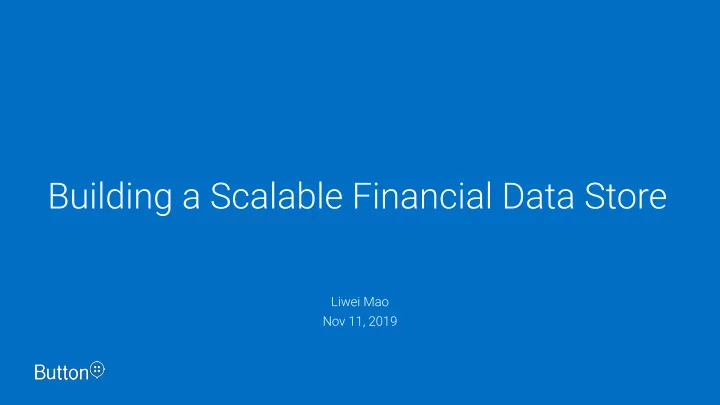

● About me ● ● ● ●
● ● ● ●
● ● A data engineering challenge ● ● ●
● ● ● ○
● ● ● ● ● ●
Transaction Data store responsible for ● ○ Billing ○ Internal debugging ○ Downstream services Reporting ■ ■ Analytics Warehouse
● OLTP (Online Transactional Processing) ■ Every write to DB = $$ exchanging hands ■ No downtime, low latency writes ■ Accuracy is crucial ● OLAP (Online Analytical Processing) ■ Monthly financial CSV exports & list endpoints ■ Easy aggregation ■ Slice and dice over arbitrary set of columns
● ● ● Mistakes we made ● ●
2 days later, he see CX sees
CSV Exports Re-pulled export on Jan 5 Downloaded CSV file on Jan 1 ● ● ●
● ● ● Our solution ● ●
1. Immutable - Records are never changed, only inserted
Why Immutable? ● Biggest pain point ● Able to track changes over time (data lineage) ● Financial data should never be mutable ○ useful for auditing ○ state is reproducible at any point in time ○ allows for correction in next accounting period
Immutable event log What CX observed was no fluke! July 3rd July 1st
1. Immutable 2. Deltas for Easy Aggregation - represent amounts in “deltas” Digiday, 2017
See total commissions by day Before After
microsoft excel stock image
Benefit of Delta ● Easy aggregation ● A single service responsible for computing deltas ● “Atomic” - self contained description of the change ● Events can arrive out of order, and end state will be eventually consistent With Latest State ● Greater tolerance for missing events, later states will overwrite incorrect earlier states
1. Immutable 2. Deltas for Easy Aggregation - represent amounts in “deltas” 3. Denormalized - few tables, lots of dimensions Digiday, 2017
Why Denormalized? More OLAP use cases than OLTP. OLAP use cases - large # of records ● Marketing - Campaign analysis ● Finance - Billing Exports & Invoices ● Data team - Analytics ● Partners - API for historical data OLTP use cases - single record ● Customer Support - Debugging individual orders ● Inserting events
Hybrid Performance Approach ● Use Postgres DB ● Denormalized Data Hybrid in the sense that data format is optimized for querying over historical time ranges yet DB is a traditional OLTP database.
For faster performance with CSV Exports and aggregations Previous Financial Data Store New Data Store - denormalized
1. Immutable 2. Deltas for Easy Aggregation - represent amounts in “deltas” 3. Denormalized - few tables, lots of dimensions 4. Separate record keeping for billing Digiday, 2017
Why keep separate records for billing? ● Need stable tracking of which events fit into each invoice ● Enable later adjustments ● Allow changes in billing logic ○ may bill on events vs orders ○ may bill per customer vs per order ○ may bill weekly vs monthly
Immutable Event Log Product/Service rendered Invoicing
1. Immutable 2. Deltas for easy aggregation 3. Denormalized 4. Separate record keeping for billing 5. Self Heal - programmatic detection & adjustment Digiday, 2017
Self-Heal - programmatic detection & adjustment ● Immutable data helps with this ● So does having separate records for billing ● Limiting points of failure Example: ● Orders that were processed “late”, that didn’t make it into the last billing cycle, should be automatically added to the next cycle ● Automatic checks of billing records (immutable) against order event records (also immutable)
Use stable ID & ordering throughout your procession pipeline Ordering (seqn) and Event ID should be set as upstream as possible in the order pipeline, and ● carried all the way downstream. Good for debugging ●
● Dates really matter. ● ○ ○ ○ ○ ○ ● ● Avoid floats Double-Entry doesn’t matter ● ○
● ● ● ●
● ● ● ●
● ● ● ●
Recommend
More recommend